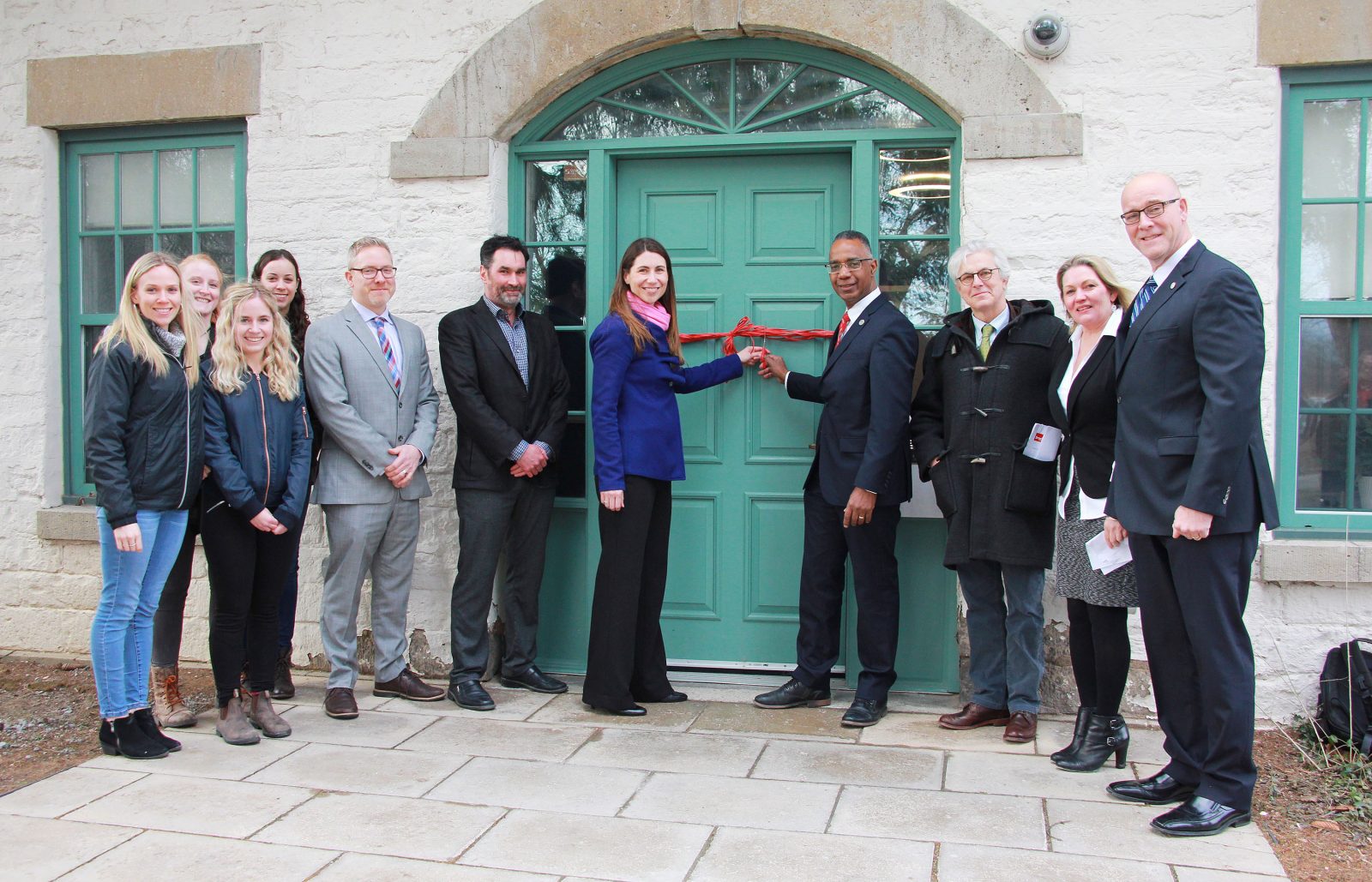 Julia Baird, Canada Research Chair in Human Dimensions of Water Resources and Water Resilience, and Brock President Gervan Fearon, centre, joined students, staff, faculty and senior administration in officially opening the new Environmental Sustainability Research Centre on Wednesday, Feb. 28.
Julia Baird, Canada Research Chair in Human Dimensions of Water Resources and Water Resilience, and Brock President Gervan Fearon, centre, joined students, staff, faculty and senior administration in officially opening the new Environmental Sustainability Research Centre on Wednesday, Feb. 28.It was built nearly two centuries ago, but the oldest structure on Brock’s campus has been given new life and a new purpose as a focal point for the University’s sustainability efforts.
Theal House, an original farm cottage that dates to 1837, has been transformed into the home of Brock’s Environmental Sustainability Research Centre (ESRC), which produces world-class research and educates students in topics relating to environmental sustainability.
Unveiled during a ribbon-cutting ceremony Wednesday, Feb. 28, the revamped space features sustainable flooring and furniture, as well as an integrated system that controls heating, cooling and lighting, and monitors real-time energy use for the entire campus.

Environmental Sustainability Research Centre Director Ryan Plummer, left, reads over a new project charter with Tom Dunk, Interim Provost and Vice-President, Academic, and Brian Hutchings, Vice-President, Administration. The agreement will see the ESRC work with Brock’s Facilities Management team on upcoming sustainability initiatives.
LED lighting has also been installed throughout the heritage building, with dimmer and daylight harvesting switches in place to reduce energy consumption.
In addition to highlighting the space, Wednesday’s ceremony was an opportunity to solidify a new collaboration between the ESRC and Brock’s Facilities Management team. The collaboration is enshrined in a formal charter that brings together the academic and operations units on various sustainability initiatives on campus. It is also an important step forward for Brock’s new integrative approach to environmental sustainability, and deepens the University’s commitment to sustainability — one of the seven core values listed within its strategic plan.
Also announced Wednesday was $5,000 in new scholarship funding provided by Toromont CAT that will support students studying sustainability.
Professor and ESRC Director Ryan Plummer said the partnership signals a new era in the University’s journey to be a national leader in sustainability.
“The charter enables rich opportunities for experiential education relating to environmental sustainability, and the scholarships recognize as well as support excellence in this area of study,” said Plummer. “They will have a profound and positive impact by enhancing student experience, promoting innovative approaches for learning excellence and furthering engagement with sustainability.”
Brock has been dedicated to improving energy and operational efficiency on campus with dozens of energy projects and green initiatives completed over the years, said Scott Johnstone, the University’s Associate Vice-President, Facilities Management.
“Moving forward, we want to further our partnership with staff, students, faculty members and the larger Brock community to enhance, challenge and maintain a campus culture of sustainability.”

Sean Goodman and Ron Cocking, of Toromont CAT, presented Scott Johnstone, Brock’s Associate Vice-President, Facilities Management, and Ingrid Makus, interim Dean of the Faculty of Social Sciences, with $5,000 to support students in sustainability programming at Brock.
Hands-on experiential learning opportunities that contribute to sustainability at the University will be made available to students through co-op placements, research assistant opportunities, independent research and course-based projects.
This week’s announcements reinforce the University’s values around sustainability, while also taking into consideration Brock’s role in a global context, said President Gervan Fearon. “We’re part of the broader ecosystem and as such, we need to think about the impact our footprint has and what our actions in support of sustainability mean.”
Brock recognizes its distinction as one of only a few universities within a UNESCO World Biosphere Reserve and intends to continue pushing forward with its environmental sustainability initiatives, he said.
Brock’s programs concentrating on sustainability are growing quickly. The Master of Sustainability program was introduced in 2014 and continues to receive considerable uptake from across Canada and around the world. In 2017, the ESRC launched the Minor in Environmental Sustainability and early signs suggest it is following a similar positive trajectory.

Theal House is now the home of Brock’s Environmental Sustainability Research Centre.


